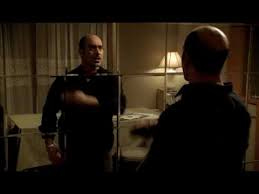
Season four is a departure from the previously established norms of The Sopranos in many ways, not the least of which is the fact that its requisite “AJ is a colossal dumbass” episode is one of its strongest installments. In “Everybody Hurts,” recurring themes begin to gel into something more consistent and cohesive. Up to this point, anxieties around money have driven the bulk of the conflict between Tony and Carmela, as well as some of Tony’s professional choices, but they’ve pretty much been relegated to those spaces.
Here, those anxieties break open into something more wide-ranging and complex. It’s not just that they’re shared by characters other than Tony and Carmela, but that they’re wrapped up in a broader set of stresses involving our connections to one another, and the impossibility of genuine human intimacy in a context that treats human relationships in primarily transactional — and I mean that not just in a monetary sense — terms.
The Artie plotline, for example, is a story about a man who does not have enough money and engages in reckless, irrational behavior in order to try to dig himself out of his financial hole. But his lack of funds is complicated by his relationships with other people. As Charmaine points out, Tony simply paying his $6,000 Vesuvio tab would put a significant dent in Artie’s financial struggle — but Artie will never press Tony, and instead asks Ralphie for a loan, which is dark. And Ralphie’s refusal to lend Artie the money suggests that he doesn’t have it himself; he would love to lord a few thousand dollars over the head of a vulnerable person if given a viable opportunity.
Painted into a corner, Artie turns to a scam. But the scam is also wrapped up in interpersonal dynamics, as our big divorced earring-wearing boy falls for it as a direct result of his own horniness. (As in her dead-on assessment of Tony as part of the financial problem, Charmaine is also right to tell her ex that Elodie is never going to fuck him.) This escalates the situation to the point where Tony has no choice but to recognize his own role in it — which he both inflates and minimizes. He’s pissed at Artie for not groveling to him for a loan and for putting his reputation at risk, but also incapable of giving an accurate tally of the money he owes his friend. But he does, I think, on some level, genuinely feel bad — as evidenced by the fact that he tries to make good by giving Artie the gift of a Furio smackdown of the scammer.
While Tony is willfully oblivious to the transactional contours of his relationship with Artie, he doesn’t have problems seeing them in his interactions with women. He gives into Carm’s trust idea and immediately returns to his old infidelity habit. He rages at Melfi over the fact that he found out about Gloria’s suicide from his wife and not her — a violation of what he imagines to be the transactional terms of their patient-doctor relationship — and then pivots to a cruel “I bet you charged her enough, didn’t you?” — a violation of what he imagined were the transactional terms of that patient-doctor relationship. (Next week, we’ll learn that he tries to make up for this act of cruelty by sending her flowers. It doesn’t work.)
In an effort to assuage his guilt over Gloria, he takes Janice out to dinner at Vesuvio and plies her about her own experiences with loved ones dying from suicide. Her hot takes don’t grant him the absolution he’s looking for, so he makes a donation to a suicide hotline in Gloria’s name. That’s not a bad thing to do, and it’s touching that he even thought of it — but it’s also not a path to the relief he’s searching for; it’s a monetary action masquerading as emotional closure. I think the timing of the Gloria news within the larger arc of the season is fascinating. An upcoming major character death is often interpreted as related to Tracee’s murder — and that interpretation clearly isn’t wrong — but I also wouldn’t discount the fact that learning about Gloria’s suicide destabilizes Tony, even though he pretends to firmly shut the door on his feelings during this week’s second therapy session.
While Tony comes off looking the worst of anyone on this count, his transactional approach to relationships is clearly not unique to the Sopranos’ world. AJ’s new, old-money girlfriend Devin uses him for the street cred inherent in dating a mobster’s son — and AJ, in return, receives an unwanted education in the difference between having money and having wealth. (Shout out to baby bowlcut Paul Dano treating Devin’s dad’s house like the set of The Price is Right.) Though things are more tenuous than usual, the Sopranos certainly aren’t broke — and the way Tony makes his money probably isn’t any more or less repulsive than whatever the Picasso-owning Mr. Pillsbury does (or whatever his father, grandfather, and/or great-grandfather did.) But they nonetheless exist outside the boundaries of respectable money-hunger; they’ll never have access to the power that longstanding generational wealth buys you in America.
